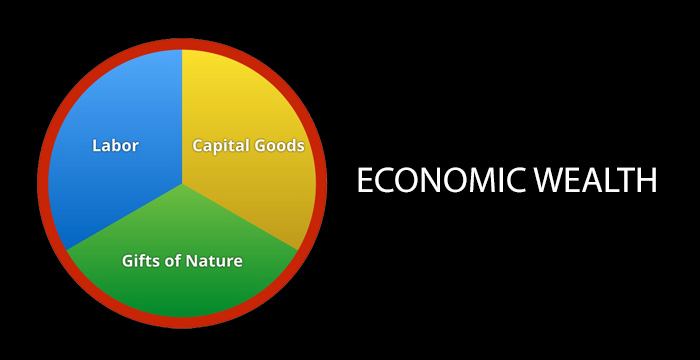Basic economics says that whenever we make anything there are three fundamental inputs. In economics these inputs are called Factors of Production – land, labour, and capital. Land in this context is what the planet offers, so in addition to land there is water and air, but also oil, iron, aluminum, etc. We all know what labour is. Capital is what people have created, the tools, that can be used in the production of the goods we want.
Whenever we make anything we combine these three inputs. There are many ways of combining the three inputs, and how they are combined will depend on what is readily available and the relative price of the inputs. Consider a poor farmer in say, Africa. The only tool, the only capital, he has access to is a hoe. With this he digs up his field and plants his crop. He does not use much land. In that case, only significant input to the food he is producing is labour.
When I plant a garden, I put a higher value on my labour. I want it to more efficient. So I use a walk behind tiller. The tiller is capital. I have reduced my labour and increased the capital input when I produce my food. If I am using the land in my back yard which no one else wants, the land input is minimal.
A commercial farmer in Manitoba uses a large amount of land. In addition to the land, the Manitoba farmer uses fertilizer, fertilizer that has been mined. And he uses a significant amount fossil fuel. So the “land” input is significant. He also needs large tractor and other equipment. Our Manitoba farmers needs a huge amount of capital. The labour input to the food that we eat is minimal. This has been the contribution of industrialization.
We combine the factors of production based on what is available to us, and on the relative cost of these different factors. The price of the factors of production is very important because it affects the way we combine these inputs to produce the goods we want. This is why the price of the inputs we use should be the real price not some artificial price. Unfortunately in today’s industrialized world the price of any input is rarely the real price.
When farmers produce food, they consume oil in their tractors and fertilizer. The price of that oil covers the cost of extracting and delivering this input. But that oil is gone and will not be recovered. Surely the price of the oil should include something for that. The price of the oil does not recognize the CO2 going into the atmosphere, nor the cost of cleaning up spills, etc. In fact we offer subsidies to companies wishing to develop new oil. So oil is seriously under-priced. In the same way the cost of most of the resource inputs we use in our industrialized world are under-priced. Oddly enough, land, which is not depleted by use, is taxed.
Labour, on the other hand, is overpriced, primarily due to taxation. The income tax and the payroll tax our governments collect have the effect of increasing the price of labour, thereby discouraging the use of labour in any production process.
Surely it is time we corrected this artificial skewing of the price of the factors of production we use every day. We have shown in an earlier essay, that there was a time when the taxation decisions with respect to resources and labour made sense. But that was then and this is now. It is time our government corrects our taxation system to reflect today’s realities.




